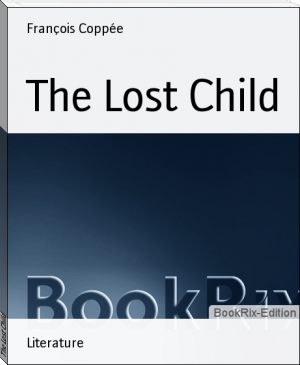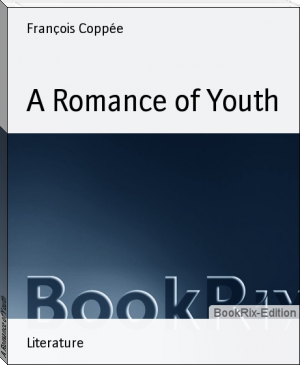International Short Stories: French - - (new books to read .TXT) 📗

- Author: -
- Performer: -
Book online «International Short Stories: French - - (new books to read .TXT) 📗». Author -
I still remember having seen our colonel, M. de Montrevert, firm and erect upon his horse, gazing quietly towards the enemy. That man appeared to me immense. He had no rifle to amuse himself with, and his breast was expanded to its full breadth above us. From time to time, he looked down, and exclaimed in a dry voice:
“Close the ranks, close the ranks!”
We closed our ranks like sheep, treading on the dead, stupefied, and continuing firing. Until then, the enemy had only sent us bullets; a dull explosion was heard and a shell carried off five of our men. A battery which must have been opposite us and which we could not see, had just opened fire. The shells struck into the middle of us, almost at one spot, making a sanguinary gap which we closed unceasingly with the obstinacy of ferocious brutes.
“Close the ranks, close the ranks!” the colonel coldly repeated.
We were giving the cannon human flesh. Each time a soldier was struck down, I was taking a step nearer death, I was approaching the spot where the shells were falling heavily, crushing the men whose turn had come to die. The corpses were forming heaps in that place, and soon the shells would strike into nothing more than a mound of mangled flesh; shreds of limbs flew about at each fresh discharge. We could no longer close the ranks.
The soldiers yelled, the chiefs themselves were moved.
“With the bayonet, with the bayonet!”
And amidst a shower of bullets the battalion rushed in fury towards the shells. The veil of smoke was torn asunder; we perceived the enemy’s battery flaming red, which was firing at us from the mouths of all its pieces, on the summit of a hillock. But the dash forward had commenced, the shells stopped the dead only.
I ran beside Colonel Montrevert, whose horse had just been killed, and who was fighting like a simple soldier. Suddenly I was struck down; it seemed to me as if my breast opened and my shoulder was taken away. A frightful wind passed over my face.
And I fell. The colonel fell beside me. I felt myself dying. I thought of those I loved, and fainted whilst searching with a withering hand for my uncle Lazare’s letter.
When I came to myself again I was lying on my side in the dust. I was annihilated by profound stupor. I gazed before me with my eyes wide open without seeing anything; it seemed to me that I had lost my limbs, and that my brain was empty. I did not suffer, for life seemed to have departed from my flesh.
The rays of a hot implacable sun fell upon my face like molten lead. I did not feel it. Life returned to me little by little; my limbs became lighter, my shoulder alone remained crushed beneath an enormous weight. Then, with the instinct of a wounded animal, I wanted to sit up. I uttered a cry of pain, and fell back upon the ground.
But I lived now, I saw, I understood. The plain spread out naked and deserted, all white in the broad sunlight. It exhibited its desolation beneath the intense serenity of heaven; heaps of corpses were sleeping in the warmth, and the trees that had been brought down, seemed to be other dead who were dying. There was not a breath of air. A frightful silence came from those piles of inanimate bodies; then, at times, there were dismal groans which broke this silence, and conveyed a long tremor to it. Slender clouds of grey smoke hanging over the low hills on the horizon, was all that broke the bright blue of the sky. The butchery was continuing on the heights.
I imagined we were conquerors, and I experienced selfish pleasure in thinking I could die in peace on this deserted plain. Around me the earth was black. On raising my head I saw the enemy’s battery on which we had charged, a few feet away from me. The struggle must have been horrible: the mound was covered with hacked and disfigured bodies; blood had flowed so abundantly that the dust seemed like a large red carpet. The cannon stretched out their dark muzzles above the corpses. I shuddered when I observed the silence of those guns.
Then gently, with a multitude of precautions, I succeeded in turning on my stomach. I rested my head on a large stone all splashed with gore, and drew my uncle Lazare’s letter from my breast. I placed it before my eyes; but my tears prevented my reading it.
And whilst the sun was roasting me in the back, the acrid smell of blood was choking me. I could form an idea of the woeful plain around me, and was as if stiffened with the rigidness of the dead. My poor heart was weeping in the warm and loathsome silence of murder.
Uncle Lazare wrote to me:
“My Dear Boy,—I hear war has been declared; but I still hope you will get your discharge before the campaign opens. Every morning I beseech the Almighty to spare you new dangers; He will grant my prayer; He will, one of these days, let you close my eyes.
“Ah! my poor Jean, I am becoming old, I have great need of your arm. Since your departure I no more feel your youthfulness beside me, which gave me back my twenty summers. Do you remember our strolls in the morning along the oak-tree walk? Now I no longer dare to go beneath those trees; I am alone, I am afraid. The Durance weeps. Come quickly and console me, assuage my anxiety——”
The tears were choking me, I could not continue. At that moment a heartrending cry was uttered a few steps away from me; I saw a soldier suddenly rise, with the muscles of his face contracted; he extended his arms in agony, and fell to the ground, where he writhed in frightful convulsions; then he ceased moving.
“I have placed my hope in the Almighty,” continued my uncle, “He will bring you back safe and sound to Dourgues, and we will resume our peaceful existence. Let me dream out loud and tell you my plans for the future.
“You will go no more to Grenoble, you will remain with me; I will make my child a son of the soil, a peasant who shall live gaily whilst tilling the fields.
“And I will retire to your farm. In a short time my trembling hands will no longer be able to hold the Host. I only ask Heaven for two years of such an existence. That will be my reward for the few good deeds I may have done. Then you will sometimes lead me along the paths of our dear valley, where every rock, every hedge will remind me of your youth which I so greatly loved——”
I had to stop again. I felt such a sharp pain In my shoulder, that I almost fainted a second time. A terrible anxiety had just taken possession of me; it, seemed as if the sound of the fusillade was approaching, and I thought with terror that our army was perhaps retreating, and that in its flight it would descend to the plain and pass over my body. But I still saw nothing but the slight cloud, of smoke hanging over the low hills.
My uncle Lazare added:
“And we shall be three to love one another. Ah! my well-beloved Jean, how right you were to give her to drink that morning beside the Durance. I was afraid of Babet, I was ill-humoured, and now I am jealous, for I can see very well that I shall never be able to love you as much as she does, ‘Tell him,’ she repeated to me yesterday, blushing, ‘that if he gets killed, I shall go and throw myself into the river at the spot where he gave me to drink.’
“For the love of God! be careful of your life. There are things that I cannot understand, but I feel that happiness awaits you here. I already call Babet my daughter; I can see her on your arm, in the church, when I shall bless your union. I wish that to be my last mass.
“Babet is a fine, tall girl now. She will, assist you in your work——”
The sound of the fusillade had gone farther away. I was weeping sweet tears. There were dismal moans among soldiers who were in their last agonies between the cannon wheels. I perceived one who was endeavoring to get rid of a comrade, wounded as he was, whose body was crushing his chest; and, as this wounded man struggled and complained, the soldier pushed him brutally away, and made him roll down the slope of the mound, whilst the wretched creature yelled with pain. At that cry a murmur came from the heap of corpses. The sun, which was sinking, shed rays of a light fallow colour. The blue of the sky was softer.
I finished reading my uncle Lazare’s letter.
“I simply wished,” he continued, “to give you news of ourselves, and to beg you to come as soon as possible and make us happy. And here I am weeping and gossiping like an old child. Hope, my poor Jean, I pray, and God is good.
“Answer me quickly, and give me, if possible, the date of your return. Babet and I are counting the weeks. We trust to see you soon; be hopeful.”
The date of my return!—I kissed the letter, sobbing, and fancied for a moment that I was kissing Babet and my uncle. No doubt I should never see them again. I would die like a dog in the dust, beneath the leaden sun. And it was on that desolated plain, amidst the death-rattle of the dying, that those whom I loved dearly were saying good-bye. A buzzing silence filled my ears; I gazed at the pale earth spotted with blood, which extended, deserted, to the grey lines of the horizon. I repeated: “I must die.” Then, I closed my eyes, and thought of Babet and my uncle Lazare.
I know not how long I remained in a sort of painful drowsiness. My heart suffered as much as my flesh. Warm tears ran slowly down my cheeks. Amidst the nightmare that accompanied the fever, I heard a moan similar to the continuous plaintive cry of a child in suffering. At times, I awoke and stared at the sky in astonishment.
At last I understood that it was M. de Montrevert, lying a few paces off, who was moaning in this manner. I had thought him dead. He was stretched out with his face to the ground and his arms extended. This man had been good to me; I said to myself that I could not allow him to die thus, with his face to the ground, and I began crawling slowly towards him.
Two corpses separated us. For a moment I thought of passing over the stomachs of these dead men to shorten the distance; for, my shoulder made me suffer frightfully at every movement. But I did not dare. I proceeded on my knees, assisting myself with one hand. When I reached the colonel, I gave a sigh of relief; it seemed to me that I was less alone; we would die together, and this death shared by both of us no longer terrified me.
I wanted him to see the sun, and I turned him over as gently as possible. When the rays fell upon his face, he





Comments (0)